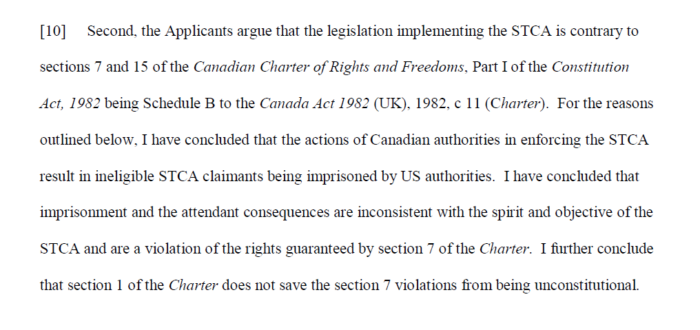
On July 22, a federal court in Canada ruled that the Safe Third Country Agreement (STCA) between Canada and the United States violates the Canadian Charter of Rights and Freedom, the equivalent to the U.S. Bill of Rights in its constitution. Under this agreement, in effect since 2004, Canada has refused to consider refugee claims presented by individuals entering from the United States on the ground that the United States is a “safe country” in which to apply for asylum. It should be noted that this is the second non-governmental organization (NGO) challenge to the STCA, the first a 2007 lawsuit, which lost at the appeals level on technical grounds. Professor Deborah Anker served as an expert witness on US asylum law and policy in that earlier case as well. Especially given the increasing attacks on asylum rights by the Trump administration, the Canadian NGOs have urged the Trudeau administration to immediately implement the court’s decision, despite the six-month delay permitted by the court.
The Harvard Immigration and Refugee Clinical Program has issued multiple reports highlighting the negative impact of the STCA on asylum seekers. In 2013, for example, the Program released the report Bordering on Failure: Canada-U.S. Border Policy and the Politics of Refugee Exclusion, which details the dangerous effects the STCA has on asylum claims in Canada. HIRC noted that in the past, Canada provided the model upon which fairer treatment of refugees and better asylum processes developed in the United States. The report, co-authored by Professor Efrat Arbel of the University of Colombia School of Law and a Harvard Law LLM graduate, however, showed a deteriorating trend in Canada. In 2017, HIRC requested an emergency hearing in front of the Inter-American Commission on Human Rights to address the STCA, and, later that year, students submitted testimony to the IACHR, in which they argued that the United States is not a “safe country of asylum.”
We would like to thank all the students who have worked on this issue over the years and extend our congratulations to Professor Anker, who, for many years, has been a leader on this issue and US’ compliance with domestic and international law on the rights of refugees.